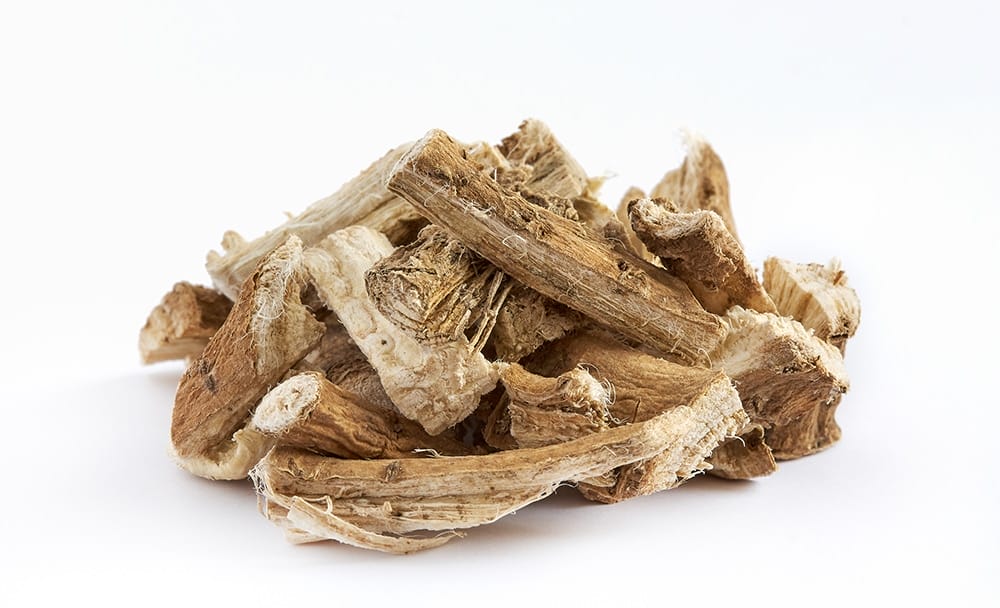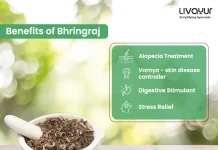
Are you fond of marshmallows? Did you know that traditionally marshmallows were made from the sap of a plant?
Yes, you heard it right. This popular dessert used to be originally prepared from the marshmallow plant, which is not only a culinary plant but also a medicinal plant.
Although it is native to Eastern Europe, marshmallows are also abundantly found in India, in the states of Punjab, Kashmir and Himachal Pradesh. Known as Khatmi in Ayurveda, its roots are vastly used to treat diseases like colds, coughs, congestion, constipation, gastritis, etc.
Let’s find out more about marshmallows and the benefits of their roots in this article.
What are the Ayurvedic Properties of Marshmallows?
According to Ayurveda, marshmallow or Khatmi has the following properties:
- It has Madhura or sweet Rasa (taste)
- It is unctuous (Snigdha), slimy (Picchila) and heavy (Guru)
- It is cold in potency
- It helps to pacify the aggravated Vata and Pitta Dosha in the body
What are the Pharmacological Actions of Marshmallow Roots?
- Demulcent: Khatmi helps to soothe or protect the irritated mucosal lining of the mouth and gastrointestinal tract.
- Resolvent: As a resolvent, marshmallow roots are highly effective in reducing inflammation in the body.
- Analgesic: Marshmallow roots are also highly beneficial in relieving pain in the body.
- Laxative: It is a mild laxative and helps to treat constipation.
- Haemostatic and Astringent: Khatmi has haemostatic and astringent properties, making it highly effective in stopping bleeding and preventing blood loss or haemorrhage.
- Anti-microbial: It exhibits anti-microbial activities, therefore aids in fighting infections.
- Antiseptic: Marshmallow roots also have antiseptic effects, and therefore, help to heal wounds.
What are the Therapeutic Uses of Marshmallow Roots?

- Relieves Cough:
As a potent demulcent, marshmallow roots have been known to relieve the symptoms of dry cough and many other respiratory problems such as bronchitis, chest congestion, etc.
- Aids in Dry Mouth:
Dry mouth is a condition that can lead to several dental problems such as cavities, gum diseases and infections. Marshmallow roots exhibit demulcent properties, and therefore, aids in treating dry mouth.
- Prevents Ulcers:
Marshmallow roots have anti-inflammatory properties and therefore are one of the best herbs to prevent and treat gastric and peptic ulcers.
- Relieves Skin Irritation:
Marshmallow roots help to reduce inflammation in the skin and soothe skin irritation. They also aid in healing sun-damaged skin and skin ulcers.
- Prevents Damage By Gastric Reflux:
Gastric reflux can damage the oesophagus in the body. Marshmallow roots have a demulcent effect, and therefore, help to protect the oesophagus from gastric acids by coating it with mucilage.
- Heals Wounds:
The roots of marshmallows have antiseptic properties and are known to be an age-old remedy for healing wounds, cuts and burns.
- Other Therapeutic Uses:
Marshmallow roots also help in the treatment of many other disorders such as urinary disorders, bloating, indigestion, constipation, varicose veins, etc.
How to Use Marshmallow Roots?
- Marshmallow roots can be used in the form of paste and applied on the skin to treat skin problems, bruises and ulcers.
- Khatmi can also be used as a decoction, prepared from the roots of the herb. You may gargle with it to relieve respiratory problems and dental disorders.
- You may also drink herbal tea made from the roots, especially if you have a sore throat or dry cough.
Are There Any Risks of Using Marshmallow Roots?
There are no adverse side effects of using marshmallow roots. However, some people may suffer from allergic reactions. Therefore, it is recommended to use marshmallow roots only after consulting an ayurvedic practitioner.
Takeaway:
Marshmallow roots offer many health benefits. They contain important nutrients and exhibit many medicinal properties that aid in treating and preventing a myriad of diseases pertaining to the respiratory, urinary and gastrointestinal systems. However, you must use this herb only after consulting it with a doctor.





















I would like to thnkx for the efforts you have put in writing this blog. I am hoping the same high-grade blog post from you in the upcoming as well. In fact your creative writing abilities has inspired me to get my own blog now. Really the blogging is spreading its wings quickly. Your write up is a good example of it.